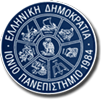Ερευνητικές Ομάδες
LUCA CHRISTIANΙδιότητα: Καθηγητής/Πανεπιστήμιο Κάτω Δούναβη, Ρουμανία
Αντικείμενο στο Πρόγραμμα: Πόλεις-λιμάνια Ρουμανίας
Cristian Luca attended the University of Bucharest, where he took a B.A. in Medieval History in 1999, an M.A. in Eastern European Medieval and Early Modern History in 2001 and a Ph.D. degree magna cum laude in Early Modern European History in 2006. He was awarded the «Nicolae Iorga» National Fellowship for Research and Postgraduate Specialization in Venice from 2002 to 2004, and was Andrew W. Mellon Postdoctoral Fellow to the Netherlands Institute for Advanced Study in the Humanities and Social Sciences from September 2008 to February 2009, and was also awarded other grants and stipends for research and specialist training in Italy. Professor of Late Medieval and Early Modern History at the Lower Danube University of Galaţi (Romania), he teaches Late Mediaeval and Early Modern history of Eastern Europe and the Romanian Principalities. He is currently the Deputy Director of the Romanian Institute of Culture and Humanities Research in Venice (Italy). His research interests include maritime trade in the north–western Black Sea from the sixteenth to the late eighteenth centuries, Western diplomacy and embassy staff in Constantinople during the sixteenth and seventeenth centuries, and the social and economic history of the Romanian Principalities in the Early Modern period. He started publishing in academic journals in the late 1990s on topics researched during a six-month mobility fellowship in Venice supported by the Department of Culture of the Romanian Government and the Open Society Foundation. Influenced by the work of Paolo Preto and Domenico Sella, he spent years in the archives researching Venice’s international relations and involvement in medium- and long distance trade in Eastern Europe. Much of his work on economic history has also been influenced by Immanuel Wallerstein’s World-System theory as applied to the East European region.
Επιστροφή




